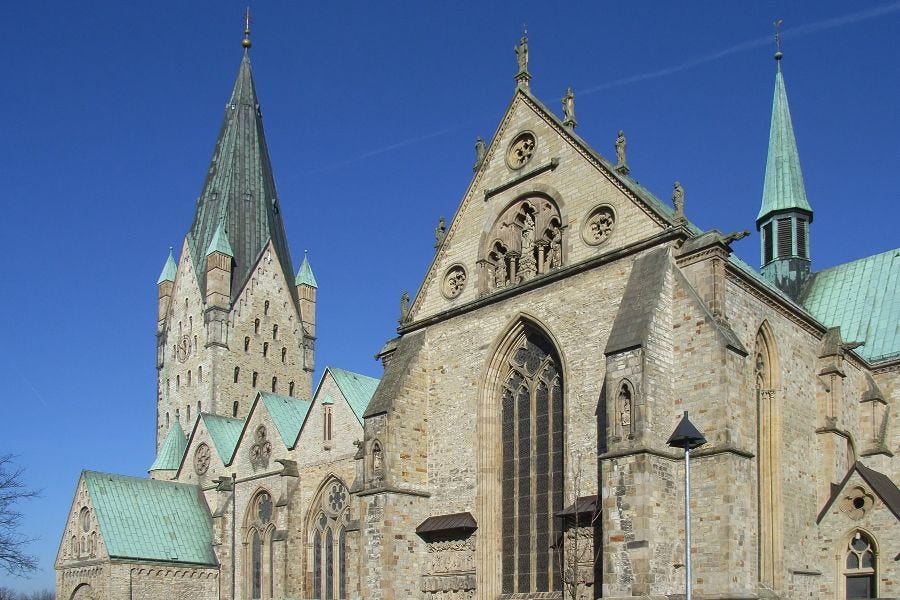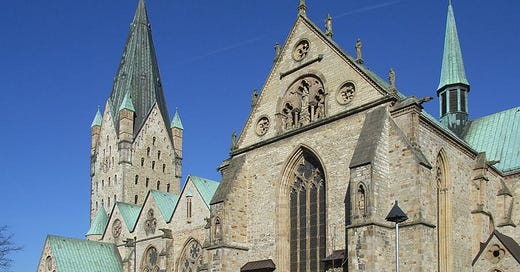
German archdiocese forms lay group to help elect next archbishop
The see in central Germany is expected to fall vacant soon.

A German archdiocese has begun to select lay people who it hopes will help to choose its next archbishop.
The Archdiocese of Paderborn announced on Sept. 5 that it had chosen the first nine members of a lay group composed of both men and women by drawing lots.
The see in central Germany, which was established in the year 799, is expected to fall vacant soon as its incumbent Archbishop Hans-Josef Becker turns 75 on June 8, 2023. He submitted his resignation to Pope Francis in June this year.
Bishops’ appointments do not follow a standard pattern across Germany due to historic regional differences. Paderborn archdiocese operates within the parameters of the Prussian Concordat, while other dioceses fall under the Bavarian or Baden Concordats.
Paderborn’s cathedral chapter plays a leading role in selecting archbishops. It draws up a list of candidates that it submits to the pope, who then sends back three names. The chapter selects one of the candidates as archbishop in a secret ballot.
According to the archdiocese’s website, “after the election, in accordance with the provisions of the Concordat, the relevant regional governments are first informed and asked whether there are any reservations of a political nature against the elected person. The pope then appoints the new archbishop.”
The archdiocese plans to form a group of 14 lay people to work with 14 cathedral canons to draw up the initial list and then choose from the three names identified by the pope.
The creation of the 28-person group is a response to a text adopted by the German “synodal way” in February. The document, entitled “Involvement of the faithful in the appointment of the diocesan bishop,” says that cathedral chapters should work with an elected body representing “the entire people of God in the diocese” to determine the list of suitable candidates that the chapter sends to the Vatican.
A majority of chapter members in Paderborn archdiocese welcomed the document’s recommendations in February. They drew up proposals in June for involving lay people in the election of an archbishop, according to the synodal way’s guidelines.
German Catholic media reported that Paderborn was the first diocese to draw up a specific proposal to implement the synodal way document.
Archbishop Becker is a strong supporter of the synodal way and, according to the archdiocese, approves of the plan for lay people in participate in the selection of his successor.
After an initial meeting to discuss procedures and the ideal profile of the next archbishop, the 28-person group would create a list of candidates at a second meeting. The names would be forwarded to the Vatican via the apostolic nuncio to Germany.
But the initiative faces several major obstacles.
The Vatican indicated in July that German dioceses should not introduce measures approved by the synodal way before the conclusion of the global synodal process in Rome in October 2023.
A declaration issued by the Vatican’s Secretariat of State in July said that “it would not be permissible to initiate new official structures or doctrines” in German dioceses “prior to an agreed understanding at the level of the universal Church.”
As Paderborn archdiocese’s initiative is directly inspired by a synodal way resolution, it would appear to fall under this prohibition.
The archdiocese itself has noted two further problems.
First, lay people would only be able to assist in the selection of an archbishop from the final three candidates if Pope Francis extended pontifical secrecy to the group.
Second, the concordat requires that the new archbishop is elected by a majority of cathedral chapter members. Therefore, the initial list of candidates drawn up by the 28-person group would only be valid if it was explicitly approved by a majority of canons.
But supporters of the change point to Pope Francis’ recent moves at the Dicastery for Bishops, the Vatican department overseeing bishops’ appointments, arguing that innovation is possible. The pope named three women as members of the dicastery in July.
In an interview with CNN Portugal broadcast on Sept. 5, the pope said that “women are in charge of carrying out the motherhood of the Church, so to choose bishops it is good that there are women who think about how the bishops have to be, that is, the entry of women is not a feminist fad, it is an act of justice that culturally had been set aside.”





